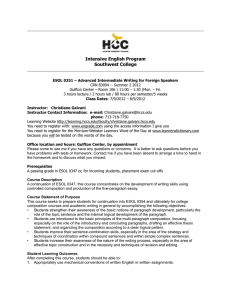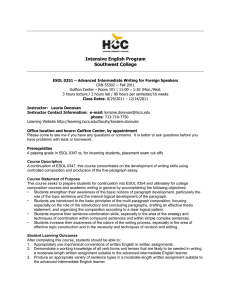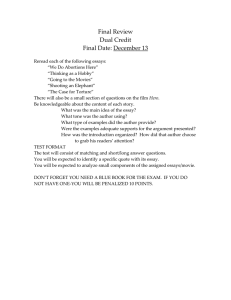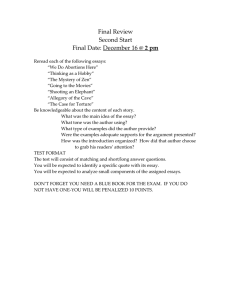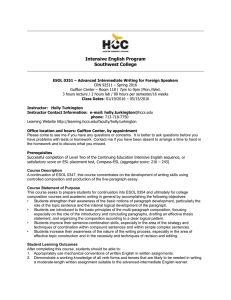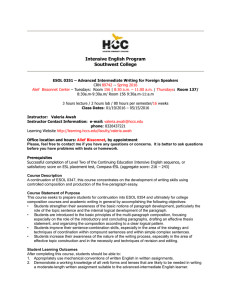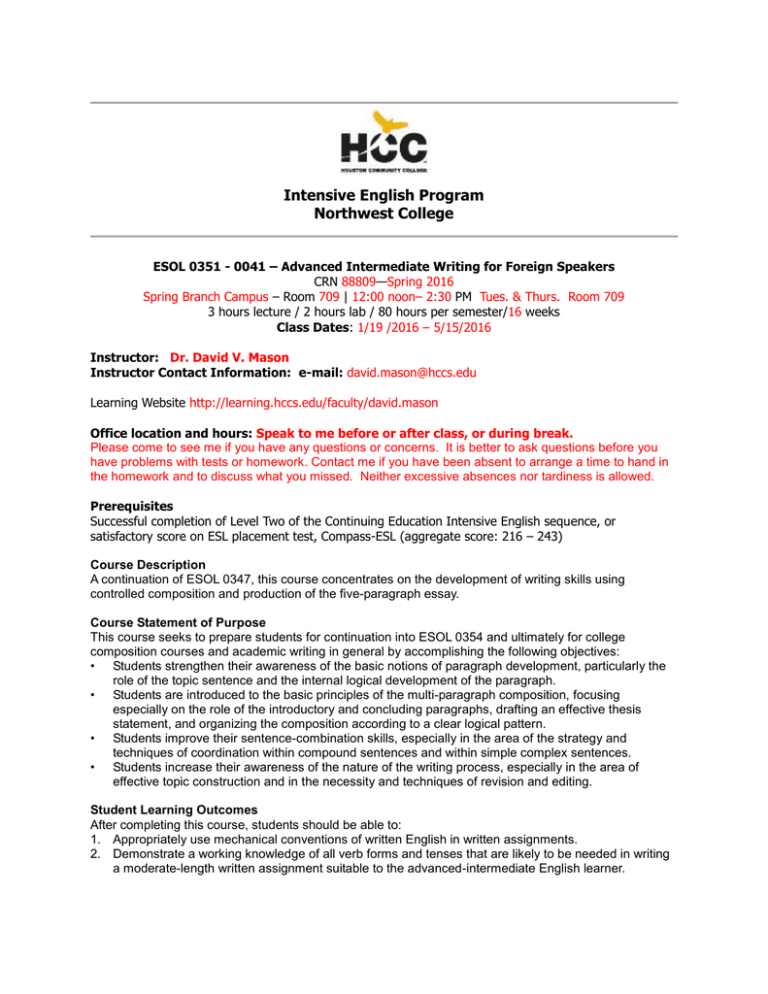
Intensive English Program
Northwest College
ESOL 0351 - 0041 – Advanced Intermediate Writing for Foreign Speakers
CRN 88809—Spring 2016
Spring Branch Campus – Room 709 | 12:00 noon– 2:30 PM Tues. & Thurs. Room 709
3 hours lecture / 2 hours lab / 80 hours per semester/16 weeks
Class Dates: 1/19 /2016 – 5/15/2016
Instructor: Dr. David V. Mason
Instructor Contact Information: e-mail: david.mason@hccs.edu
Learning Website http://learning.hccs.edu/faculty/david.mason
Office location and hours: Speak to me before or after class, or during break.
Please come to see me if you have any questions or concerns. It is better to ask questions before you
have problems with tests or homework. Contact me if you have been absent to arrange a time to hand in
the homework and to discuss what you missed. Neither excessive absences nor tardiness is allowed.
Prerequisites
Successful completion of Level Two of the Continuing Education Intensive English sequence, or
satisfactory score on ESL placement test, Compass-ESL (aggregate score: 216 – 243)
Course Description
A continuation of ESOL 0347, this course concentrates on the development of writing skills using
controlled composition and production of the five-paragraph essay.
Course Statement of Purpose
This course seeks to prepare students for continuation into ESOL 0354 and ultimately for college
composition courses and academic writing in general by accomplishing the following objectives:
• Students strengthen their awareness of the basic notions of paragraph development, particularly the
role of the topic sentence and the internal logical development of the paragraph.
• Students are introduced to the basic principles of the multi-paragraph composition, focusing
especially on the role of the introductory and concluding paragraphs, drafting an effective thesis
statement, and organizing the composition according to a clear logical pattern.
• Students improve their sentence-combination skills, especially in the area of the strategy and
techniques of coordination within compound sentences and within simple complex sentences.
• Students increase their awareness of the nature of the writing process, especially in the area of
effective topic construction and in the necessity and techniques of revision and editing.
Student Learning Outcomes
After completing this course, students should be able to:
1. Appropriately use mechanical conventions of written English in written assignments.
2. Demonstrate a working knowledge of all verb forms and tenses that are likely to be needed in writing
a moderate-length written assignment suitable to the advanced-intermediate English learner.
3. Produce an appropriate variety of sentence types in a moderate-length written assignment suitable to
the advanced-intermediate English learner.
4. Compose and revise a moderate-length composition of several paragraphs, using a clearly defined
writing process.
Learning Objectives Leading to the Outcomes Above
1.1 Correctly spell vocabulary used in compositions;
1.2 Apply rules for capitalization of beginning of sentences, proper names and other proper nouns (e.g.
cities, countries, regions, holidays, etc.);
1.3 Apply punctuation rules, especially including end punctuation (periods, question marks, exclamation
points), commas and semicolons.
2.1 Appropriately use a variety of simple, progressive, and perfect verb tenses, based on the context of
the discourse, in written assignments;
2.2 Appropriately use gerunds and infinitives as appropriate to discourse context in written assignments.
3.1 Produce compound sentences, using the seven coordinating conjunctions as well as conjunctive
adverb sentence connectors;
3.2 Produce complex sentences using a variety of subordinating conjunctions appropriate to the
discourse context, with correct punctuation;
3.3 Produce complex sentences using well-formed adjective (relative) clauses;
3.4 Produce complex sentences using well-formed noun clauses.
4.1
4.2
4.3
4.4
Use prewriting strategies to generate a topic to write about, along with supporting ideas;
Write a limited and clear thesis statement;
Organize a draft by preparing a well-formatted outline;
Write a draft of a multi-paragraph essay of 200-300 words, with a clear thesis in the introductory
paragraph and a concluding paragraph;
4.5 Revise the composition after receiving both peer feedback and feedback from the instructor.
Advisory 16-WEEK COURSE CALENDAR
Week
1
Dates
1/19 – 1/21
Lesson
Orientation, introductions, diagnostic
writing
Chapter 1
2
1/25 – 1/28
Chapters 2-3
In-Class Composition #1
3
2/1 – 2/4
Continuation of Chapters 2-3
Draft 1 of Paragraph
4
2/8 – 2/11
Continuation of Chapters 2-3
Draft 2 of Paragraph
5
2/15 – 2/18
Chapters 4-5
Draft 1 of Essay #1
6
2/22 – 2/25
Continuation of Chapters 4-5
Draft 2 of Essay #1
7
2/29 – 3/3
Chapters 4 and 6
Draft 1 of Essay #2
Materials
8
3/7 – 3/10
Continuation of Chapters 4 and 6
Draft 2 of Essay #2
Spring Break (3/14 – 3/20)
9
3/21 – 3/24 Midterm Examination
Midterm Reports
Chapter 7
10
3/28 – 3/31
Continuation of Chapter 7
Draft 1 of Essay #3
11
4/4 – 4/7
Continuation of Chapter 7
Draft 2 of Essay #3
12
4/11 – 4/14
Chapter 8
13
4/18 – 4/21
Continuation of Chapter 8
Draft 1 of Essay #4
14
4/25 – 4/28
Draft 2 of Essay #4
Chapter 9
15
5/2 – 5/5
Continuation of Chapter 9
16
5/9 – 5/12
Final Examinations
Instructional Methods
Student writing of different kinds such as essays, summaries, timed writing for fluency, and dictations
Class or group writing of outlines and essays
Individual writing of essays
Reading and analyzing paragraphs and essays to see how they are constructed
Exercises on pre-writing skills such as generating, developing and organizing ideas
Activities on grammar and vocabulary needed for a particular kind of essay
Activities on sentence types
Activities on revising an essay for content and other errors and ways to correct them
Revising and rewriting teacher-corrected compositions
Peer editing of outlines and essays
Individual conferences for essays
Lecture
Discussion (whole-class, groups, or pairs)
Activities in the textbook, on handouts, or online
Student Assignments
Homework: writing on various topics
Writing or completing work covered in class such as revising essays, writing outlines or writing essays in
whole or part, writing essays from outlines made in class work. Students will rewrite in-class essays
using teacher feedback.
Homework is due on the next class day unless otherwise stated by the instructor. Homework one day
late will receive a grade of 50%. If you are absent, you are still responsible for the homework: work
missed while absent has to be completed on your return. Please get a classmate’s phone number or
email me to find out what you missed so that you can be prepared for class.
Assessments
Five in-class compositions (and revisions) and the final composition
Weekend compositions, homework exercises, other writing
Quizzes and tests on work covered in class. There will be regular quizzes (some unannounced) over
homework or topics we have been studying. Dictionaries and electronic devices are not allowed in
writing tests and quizzes.
Automatic failure on final exam: Fewer than 150 words, off topic, no thesis statement or topic sentences,
or all simple sentences
Make up policies: If you miss ONE in-class composition, see me to arrange a time to make it up. This
will be a great inconvenience for you as essays take a long time to write and you will miss some other
class activities. DO NOT MISS COMPOSITIONS. These are major TESTS and they are very important
parts of the grade. They are also important for writing development.
Make up policy on missed homework or weekend compositions: I drop the lowest score at the end of the
semester.
Instructional Materials
Ready to Write 3, 3rd edition, Blanchard and Root (Pearson Longman Publishers)
Longman Dictionary of American English or Oxford Advanced Learner’s Dictionary
A folder to keep papers in
A 3-ring binder, dividers, and lined paper
A computer flash drive
EGLS3: Evaluation for Greater Learning Student Survey System
At Houston Community College, professors believe that thoughtful student feedback is necessary to
improve teaching and learning. During a designated time, you will be asked to answer a short online
survey of research-based questions related to instruction. The anonymous results of the survey will be
made available to your professors and division chairs for continual improvement of instruction. Look for
the survey as part of the Houston Community College Student System online near the end of the term.
HCC Policy Statement: Academic Honesty (Dishonesty = Cheating)
Any form of cheating or copying will result in a grade of 0 for that assignment and possibly
recommendation for probation or dismissal from the college system. Cheating includes copying from
another student during a test or giving another student answers on a test. Another form of cheating
(called plagiarism) is copying from the Internet or another text and presenting it as your work. An
additional form of cheating is memorizing text from the Internet or a book and presenting those words as
your own on a test or in homework. ALL work has to be written by the student and not copied from
another source.
HCC Policy Statement: Attendance
According to the HCC Student Handbook, you may be dropped from a course after accumulating
absences in excess of 12.5 percent of the total hours of instruction (lecture and lab). For Intensive English
if you exceed a total of 10 hours (12.5%) of absence in any class (= 4 full days of any class, including
labs), you can be dropped from that class. This will make F1 students out of status and cause visa
problems. Please email me if you are absent and talk to me on your return to find out the work that you
missed.
Tardiness and in-class time absence
Classes and tests begin on time. Lateness of ten minutes or more counts as class or lab absence. Three
tardies = 1 absence. Lateness after break times, leaving early or disappearing during class or lab are also
counted as absences. Texting, using social networking sites, or other improper use of technology during
class time or lab time are also counted towards your absences (1 warning = 1 tardy).
Class attendance leads to class success.
HCC Withdrawal Deadline
To drop a class, you must speak with a counselor or an advisor. The last day students may withdraw or be
dropped from a class with a grade of W is _______________ before 4:30 p.m. Students who have
excessive absences after that date will receive the grades they earn. Note: International students will
be out of status if they drop or are dropped from their classes and may have to return to their
countries. Speak with a counselor or an advisor before dropping classes to make sure you
understand the procedures.
HCC Policy on Students Repeating a Course for the Third Time
Repeating students:
Grades of IP or F are failing grades; the student will have to repeat the course. A student who fails a class
for the second time must receive a grade of F for that class. Students who repeat a course for three or
more times will have to pay a higher tuition fee at HCC and other Texas public colleges and universities. If
you are having trouble in class, talk to your teacher and get help from a tutor. Get other assistance from a
counselor before withdrawing or for advice if your grades are not passing. Students should get help so
that they will not fail.
HCC Policy Statement -- ADA
Services to Students with Disabilities Students who require reasonable accommodations for disabilities
are encouraged to report to Dr. Becky Hauri at 713-718-7910 to make necessary arrangements. Faculty
is only authorized to provide accommodations by the Disability Support Service Office. Please see this
website for more information: http://hccs.edu/student-rights
HCC Policy on Sexual Harassment
Sexual harassment in any form is not tolerated at Houston Community College. It is a violation of HCCS
policy for an employee, agent, or student of the college to engage in sexual harassment as defined in the
EEOC guidelines (EEO/AA Compliance Handbook 47). See HCCS Student Handbook for more
information.
HCC Policy on Pregnancy
Title IX of the Education Amendments of 1972 requires that institutions have policies and procedures that
protect students’ rights with regard to sex/gender discrimination. Information regarding these rights are on
the HCC website under Students-Anti-discrimination.
Students who are pregnant and require accommodations should contact any of the ADA Counselors for
assistance.
It is important that every student understand and conform to respectful behavior while at HCC. Sexual
misconduct is not condoned and will be addressed promptly. Know your rights and how to avoid these
difficult situations.
Log into www.edurisksolutions.org. Sign in using your HCC student email account, then go to the button
at the top right that says Login and enter your student number.
CLASSROOM BEHAVIOR
Treat your classmates and teacher with respect. Use English. Make the most of your class time by
actively participating in discussions and activities. Students are not permitted to use ANY electronic
devices during class. All such devices will be collected by Dr. Mason when each class starts. Do
NOT let him catch you using any such devices during class!
Use of Camera and/or Recording Devices
Use of recording devices, including camera phones and tape recorders, is prohibited in classrooms,
laboratories, faculty offices, and other locations where instruction, tutoring, or testing occurs. Students
with disabilities who need to use a recording device as a reasonable accommodation should contact the
Office for Students with Disabilities for information regarding reasonable accommodations.
Do not Electronic Devices in the Classroom
Again, the use of electronic devices by students in the classroom is forbidden by the instructor. Any use of
such devices during class is strictly prohibited. Students may be subject to disciplinary action to include
removal from the classroom or referral to the Dean of Student Services. (Please see the Attendance
Policy for this class.)
Disruptive Behavior: Students who conduct themselves in a manner that significantly interferes with
college teaching, research, administration, disciplinary procedures or other authorized college activities
(including its public service functions) on the college premises will be subject to disciplinary action.
PROGRAM AND ESL DISCIPLINE REQUIREMENTS
Basic Requirements for ESOL 0351
Students in 0351 will fulfill the following requirements:
A minimum of 5 graded compositions done in class. A maximum of one can be a graded single paragraph
(75-100 words) The rest or all will be multi-paragraph essays (200-300 words) including the final
examination.
The following rhetorical modes will be covered, including in the final examination:
Description
Definition
Comparison/contrast
Argumentation
Problem/solution
Students are required to revise and rewrite their in-class compositions (excluding the midterm and final
compositions). Students must take the revision process seriously.
Students should do regular and frequent alternative free writing activities which will be inspected regularly
by the instructor. This may take various forms such as a journal, summaries, etc.
HCC Grading Scale
90-100% =A 80 – 89% = B
70 – 79% = C
ESOL 0351 Grading Formula
Homework, classwork, quizzes, lab
Alternate writing activities
In-class Compositions, revised
Final examination
Participation
Important Dates and Holidays
Last Withdrawal Date: _______________
SPRING BREAK!! __________________
Final Exam _______________________
Below 70% = IP or F (not passing)
10%
5%
50%
20%
15%
100%


